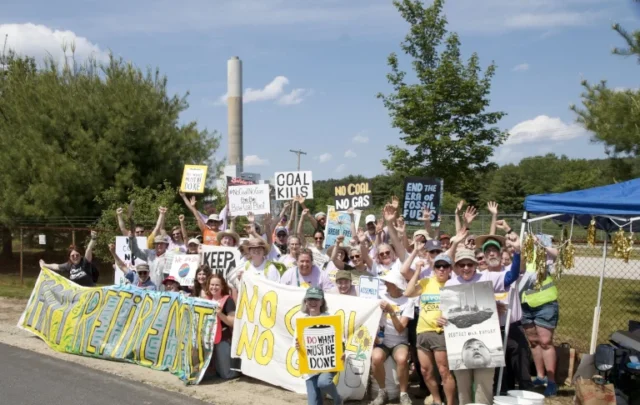Click on the headline (link) for the full text.
Many more articles are available through the Energy Bulletin homepage
Morales’ Gas Nationalization Complete
Dan Keane, Associate Press via Guardian
LA PAZ, Bolivia – President Evo Morales completed his ambitious oil and gas nationalization plan early Sunday with the last-minute signing of contracts allowing several international companies to continue operating in Bolivia under state control.
Just after a midnight Saturday deadline to wrap up the nationalization talks, Morales joined representatives of eight companies for the signing ceremony in the capital of La Paz, achieving one of his nine-month-old government’s central goals.
…Morales nationalized the South American country’s oil and gas industry on May 1, giving foreign companies 180 days to sign new deals ceding majority control of their Bolivian operations or leave the country.
At the ceremony, Morales said the petroleum nationalization would be only the first step in his campaign to recover control of Bolivia’s natural resources. Earlier this month, he announced plans to bring Bolivia’s mines under state control.
“Bolivia will not be as it was before, a beggar state with many social problems,” Morales said. “We will continue in this path of recovering our natural resources, not only the hydrocarbons but also the minerals and the non-metallics, and all nonrenewable natural resources that belong to the Bolivian people.”
The president commended the international companies for becoming “partners” in Bolivia’s future.
(29 Oct 2006)
Waiting for Nationalization
Gretchen Gordon, Znet
…The privatization of Bolivia’s oil and gas industry during the nineties was part of an ambitious economic overhaul, a condition of World Bank and International Monetary Fund restructuring plans implemented by the government of then-President Gonzalo Sánchez de Lozada. Along with five other key state industries, YPFB’s exploration, drilling, and transportation operations were turned over to private foreign control. A few years later, the subsequent government of Hugo Banzer completed the dissolution of YPFB by selling off the country’s refineries and pipelines at bargain prices.
Brazilian Petrobras paid $114 million for the Cochabamba refinery and an additional refinery in Santa Cruz. Zambrana points out that if you subtract the millions of dollars in materials, gas, and derivatives thrown in for free, Petrobras actually only paid $50 million to control 90% of Bolivia’s refining capacity – the rights, the land, the machinery, even YPFB staff.
“The land alone is worth more than that,” says Zambrana. “Basically we gave it away.”
When Sánchez de Lozada sold his privatization plan to the people of Bolivia, they were promised a road to prosperity and were assured that the Bolivian government would remain in the drivers seat. But in a series of backroom deals with foreign corporations, Bolivians were forced to watch as someone else drove off with their gas.
It was this clash between promises and reality that ignited the explosive popular demand for nationalization that brought down two Bolivian governments in the last three years and made possible Evo Morales’ unprecedented election victory last December.
Morales’ nationalization decree promised to rewrite history, to use the second largest natural gas reserves in South America to flip the fortunes of this, its poorest country.
…The international media was more than willing to corroborate the government’s story with reports of the “seizure” of oil and gas fields and corporate assets, and warnings of mass capital flight.
…Less than two weeks short of the 180-day deadline for re-negotiation of contracts, the Achilles heal of the Morales government’s policy has been laid bare. Rather than a traditional nationalization through expropriation of foreign property, Bolivia’s is a ‘nationalization’ through negotiation. And those negotiations have not gone very well.
Critics on the Bolivian left attribute the lack of progress to the moderate nature of the government’s approach, which technically isn?t a nationalization at all. They argue that without expropriating, YPFB has no capital or infrastructure and is therefore unable to be a producer, or even an effective regulator. Most importantly, it has no real control, and must haggle for every inch of change. From the most critical viewpoint, the country’s vast resource wealth is just as firmly in the hands of foreign corporations as before, and the desperate hope of many Bolivians – that they could finally benefit from the wealth beneath their feet – remains just as illusive.
(29 Oct 2006)
A view from the Left.
China limits exports of energy intensive commodities
Mercosur Press
China plans to increase taxes on exports of metals, oil and steel in an effort to contain excess investment in energy intensive industries, and simultaneously will reduce tariffs for the import of commodities reported the Finance Ministry in Beijing.
Beginning November first export taxes on copper, nickel, aluminum and other metals will be raised 15%; for petroleum, coal and coke 5% and for iron ingots, steel bars and other steel by products, 10%.
Tariffs on imports of coal, petroleum, aluminum and other mineral resources will be cut to between 0 and 3% from their current levels of 3 and 6%.
“These changes are geared to limit export of energy intensive products since the growth of these resources effectively means China is exporting energy, which it lacks”, argued Feng Fei a researcher at the Development and Research Center of the State Council, the Chinese cabinet.
(29 Oct 2006)
In one of his papers, the late ecologist and energy analyst H.T. Odum pointed out under current trade practices, the exports of poorer countries contained greater embodied energy than their imports – from an energy standpoint, trade impoverished them. The Chinese government seems to be realizing this.
It’s significant that this article appeared in Mercosur Press, an agency serving the Mercosur countries (Mercado Común del Sur = Common Market of the South) – for example Argentina, Brazil, Paraguay and Uruguay. As global blocs begin to assert themselves, they establish news outlets that reflect their points of view, rather than those of the Global North (e.g., U.S. and Europe). The quality of the journalism is much better than it was a few decades ago, for example with agencies such as Al Jazeera and Xinhuanet (China).
-BA
Miliband calls on Chancellor to devise new menu of eco-taxes
Marie Woolf, Independent
A multi-million pound menu of eco-taxes, including incentives to buy environmentally friendly washing machines and lightbulbs, has been proposed by David Miliband, the Environment Secretary, in a confidential memo to the Chancellor of the Exchequer.
The letter to Gordon Brown includes measures to limit car use and ownership with a “substantial increase” in road tax to reduce carbon emissions. The minister also calls for a “pay-per-mile pollution tax” on motorists and one on household waste.
The leaked letter says: “Differential charging for waste at household level can have a significant role to play.” It adds that household appliances that use too much energy should cost more than those designed to help the environment.
“The prices on retailers’ shelves do not reflect true environmental costs, and consumers do not always buy cost-effective, energy- efficient goods,” the letter says.
(29 Oct 2006)





